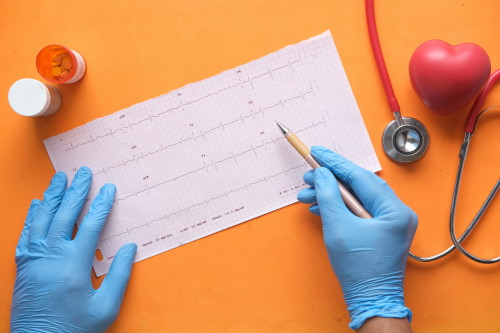When it comes to your heart rate, you want to mirror Goldilocks and be “just right”: not too fast and not too slow. You’d be surprised at how much your heart rate can tell you about your health. Learn what your heart rate means, why it changes, and what you can do to improve your heart rate.
What Is the Heart Rate?
The term “heart rate” is used in tandem with the word “pulse.” Your heart rate is measured by checking your pulse and determining how many times your heart beats per minute.
BREAKING: Viagra Obsolete: New Invention Cheaper, Safer, Faster
Your heart rate can be higher or lower, depending on a number of different factors, such as exercise and how “in shape” you are, medications, food and drink, stressors, your physical health, and more. It will vary greatly throughout the day as you move and go about your daily activities.
Your “resting” heart rate is how often your heart pumps when you are fully at rest, with no other factors spiking the speed of your pulse. Monitoring this number is important as your resting heart rate can tell you quite a bit about your overall health.
What’s a Healthy Heart Rate?
A healthy heart rate can vary from person to person and will be determined by factors such as athletic conditioning, age, body weight, and other aspects.
As you age, what is considered a normal range for resting heart rate will change. Children will tend to have higher heart rates—anywhere from 80 beats per minute all the way up to 190 in some infants. As an adult, your resting heart rate should be somewhere between 60 and 100 beats per minute. Top athletes, who are well conditioned, can have heart rate ranges as low as 40 to 60 beats per minute.
What’s a Healthy Range for Heart Rate During Exercise?
Of course, when you exercise, you’ll expect your heart rate to go up, but how much should it change as you push yourself? Health experts say your goal should be a heart rate that’s 50 – 85% of your maximum zone, depending on what type of exercise you’re doing and how hard you push yourself. And your range will also vary based on your age. For example:
| Age | 50 – 85% of Max | Maximum HR |
| 20 yrs | 100 – 170 bpm | 200 bpm |
| 30 yrs | 95 – 162 bpm | 190 bpm |
| 40 yrs | 90 – 153 bpm | 180 bpm |
| 50 yrs | 85 – 145 bpm | 170 bpm |
| 60 yrs | 80 – 136 bpm | 160 bpm |
| 70 yrs | 75 – 128 bpm | 150 bpm |
How to Check Your Heart Rate
Want to check your heart rate? It’s easy! Of course, you can use a device that reads heart rate, like your watch or a fit-bit type device. You can also check it by placing your fingertips on the inside of your wrist near the base of your thumb. (Note: Do not use your thumb as it has its own heartbeat!) Or, you can place your fingers on the side of your throat. Next, use a timer set to 30 seconds and count the number of beats you feel. Multiply by two to get your heart rate or beats per minute. (You can also count for 15 seconds and multiply by four or simply count for 60 seconds.)
What Are Some of the Warning Signs that Your Heart Is Not Healthy?
There are signs to look for that can indicate a heart that is not healthy. Some of these include:
- Feeling fatigued all the time
- Shortness of breath
- A prolonged elevated heart rate or a chronically slow heart rate
- Chest palpitations
- Chest pain
- Swollen ankles and feet
- Dizziness or fainting
Also, if your resting heart rate is high, it could be due to:
- Pain
- Stress
- Infection or fever
- Medications
- Stimulants
If your heart rate is too slow, it might mean:
- Heart disease
- Electrolyte balance is off
- Infection or fever
- Diseases (like Lyme disease)
- Thyroid issues
How to Improve Your Heart Rate
Now that you know all about heart rate: what it is, how to check it, what’s healthy, and how to know when it’s not, it’s time to get into what you need to learn to improve your heart rate.
Improve your cardiovascular conditioning—getting at least 150 minutes of some form of moderate aerobic exercise per week is recommended.
Cut back on caffeinated drinks and other stimulants—maybe you’re drinking too much coffee or downing too many energy drinks.
TRENDING: Cleanse Your Body With a Simple Natural Pill
Watch your triglycerides—get your levels tested regularly and make sure they are within normal ranges.
Keep your blood pressure in check—get your blood pressure monitored regularly to ensure you are healthy. You may not experience blatant symptoms if your pressure is high, so be sure to stay on top of it.
Clean up your diet—eating heart-healthy foods can also help you improve your heart rate. Focus on healthy fats in moderation with plenty of protein and vegetables. Skip the alcohol most of the time.
Drink your water—staying hydrated will also help you maintain a proper electrolyte balance and a healthy heart rate.
Remember, if your heart rate is too high or too low, definitely consult your doctor. Monitoring your heart rate on a regular basis can help you stay on top of your health. A lot of the lifestyle changes you can make are easy fixes to keep your heart rate in the healthy range.








